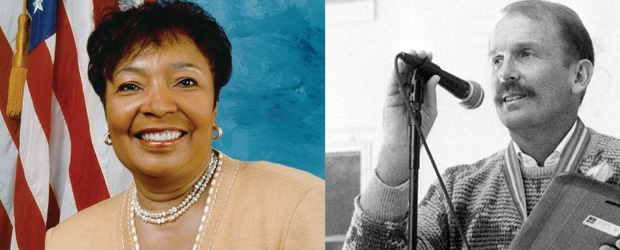But Dallas congresswoman says decision will be left to community; group starts petition calling for facility to be named for pioneering activist

STAMP OF APPROVAL | Bruce Monroe, a board member for The Dallas Way: The GLBT History Project, talks this week outside the Oak Lawn Post office. Monroe is collecting petition signatures to rename the building after pioneering Dallas gay activist Bill Nelson. (David Taffet/Dallas Voice)
 Rep. Eddie Bernice Johnson wants to rename the Oak Lawn Post Office after pioneering Dallas gay activist Bill Nelson.
Rep. Eddie Bernice Johnson wants to rename the Oak Lawn Post Office after pioneering Dallas gay activist Bill Nelson.
Johnson said her office has heard from community groups and received letters asking for her assistance in naming the post office after Nelson.
“Personally, I think Nelson would be an amazing choice, but this is not my decision to make, it is the community’s,” Johnson said. “Though he passed years ago, he is still making an impression in the neighborhood with things like the community clinic and the Resource Center of Dallas.”
Don Maison, president and CEO of AIDS Services Dallas, said he received a call from Johnson’s office asking what he thought of the idea or if someone else in the community was more deserving of the honor.
“I knew Bill and respected him,” Maison said. “He opened doors and changed minds and made a big difference in the gay community. I don’t think anyone holds a candle to Bill Nelson.”
Bruce Monroe, a board member for The Dallas Way: The GLBT History Project, said his group will collect signatures on a petition to name the post office after Nelson at this week’s Alan Ross Texas Freedom Parade and encourage people to write letters to Johnson.
Johnson told Dallas Voice that post offices are built to serve residents and communities.
“If the Oak Lawn community wants to name their post office in Bill’s honor, then it’s my job to support their wishes and proceed with proper legislative procedures,” she said.
Monroe called Nelson’s effect on Oak Lawn transformational.
“Bill made a big difference in the middle of the AIDS crisis,” Monroe said. “But he wasn’t just a gay activist, he was a community activist and a business owner in Oak Lawn.”
Nelson was a founder and early president of the Dallas Gay Alliance (now the Dallas Gay and Lesbian Alliance). He helped create the Foundation for Human Understanding (now Resource Center Dallas), using that ambiguous name because few people in Dallas at the time would write checks to an organization with AIDS in its title.
Nelson served as president of the Texas Human Rights Foundation, president of the Vickery Place Neighborhood Association and a board member of the Dallas Homeowners League.
For 10 years, he taught literature and humanities at W.T. White High School in North Dallas.
After a student recognized him in a newspaper photo taken at a gay rights rally in Lee Park, Nelson refused to accept a censure from DISD and resigned his teaching position.
Along with husband Terry Tebedo and friends William Waybourn and Craig Spaulding, he opened Crossroads Market, which functioned as Dallas’ first gay community center.
When Nelson realized some people he knew with AIDS didn’t have food to eat, he put a sign on a shelf at Crossroads Market encouraging people to leave a canned item — and people who needed the food to take the cans. That was the beginning of Dallas’ AIDS food pantry.
In 1980, Nelson began his fight against 21.06, the Texas sodomy ban. A group of political activists met in his living room to map out a strategy to enlist people to attend Democratic Party precinct conventions and become delegates to the state convention.
They successfully got a plank included in the state party platform calling for the repeal of 21.06.
In 1985 and 1987, Nelson ran for the Dallas City Council.
In 1985, Lori Palmer won the seat, but she appointed Nelson to the Civil Service Review Adjunct Board.
Nelson was forced to resign when he refused to sign an oath to abide by all Texas laws, including 21.06, which remained on the books.
In 1981, Nelson, Tebedo and other friends pulled together a new social event called Razzle Dazzle Dallas. As AIDS hit Dallas hard over the next few years, that event rapidly became a major fundraiser for the new AIDS service organizations.
In 1985, Nelson was honored with the third Black Tie Dinner Humanitarian of the Year Award, now known as the Ray Kuchling Award.
In 1989, Johnson, then a state senator, authored legislation prohibiting discrimination against persons with AIDS and improving access to health care for them. She sponsored a resolution that passed the Texas Senate honoring Nelson for his accomplishments as a community leader.
Before he died, Resource Center Dallas named its health clinic after Nelson and Tebedo.
The clinic was originally called The William Nelson Terry Tebedo Community Clinic for AIDS Research.
Nelson died on Feb. 22, 1990. He was 40.
His funeral was attended by about 600 people, including modeling agent Kim Dawson, former Mayor Adlene Harrison and Councilwoman Diane Ragsdale. Written tributes came from U.S. Rep. John Bryant, state Reps. David Cain of Dallas and Craig Washington of Houston and Lt. Gov. Bill Hobby.
This article appeared in the Dallas Voice print edition September 14, 2012.


